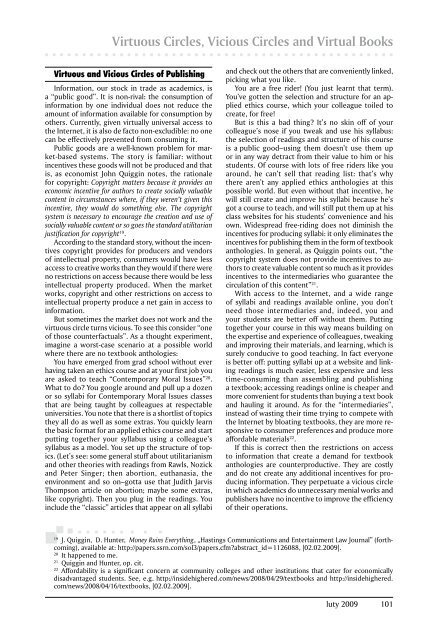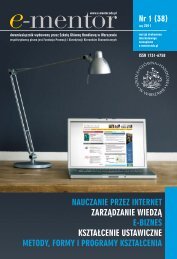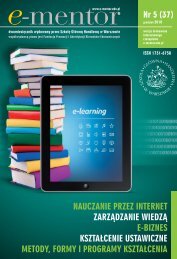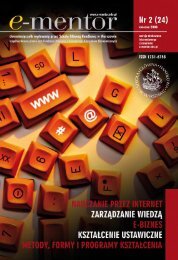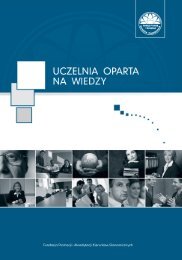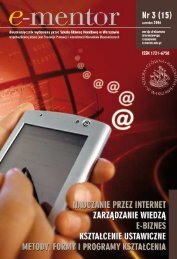e-<strong>edukacja</strong> na świecieWithout surveying the literature available onlinefor other humanities disciplines, it seems to mea safe guess that any course for which the primaryreadings are either journal articles or historicalworks in the pubic domain can be put online withvery little effort.Some courses however are not like that. In mathematics,logic and the empirical sciences undergraduatestudents do not read journal articles or historicalworks. They need textbooks with worked examples,explanations and exercises. Such textbooks are commercialproducts. Writing them is donkey work anddoes not, at most institutions, count as “research”.It seems reasonable to assume therefore that authorsare motivated by crassly material interests and will notmake their work available online for free.In fact there is a growing number of free onlinetextbooks for math, logic and the empirical sciences.Forallx (http://www.fecundity.com/logic/), for example,is an excellent standard introductory logic text withworked examples and exercises, published onlineby P. D. Magnus under a Creative Commons license.Magnus has chosen a Creative Commons licensethat allows users to modify as well as reproduce anddistribute his text, so as I migrate my logic course 16to the Internet I will modify bits of it and use themfor my purposes. Other online textbooks are notnative to the Internet. Gilbert Strang has made hisCalculus 17 , a standard calculus textbook which is stillin print, available online for free through MIT OpenCourseware 18 .Currently the selection of free online textbooksis limited. Arguably however instructors selectingtextbooks for their courses should consider onlinetextbooks along with standard hardcopy options.In addition to cost considerations, online textbooksprovide both students and instructors with greaterflexibility than conventional hardcopy texts. Instructorscan make them available online and, if theychoose, have them duplicated and bound by theiruniversity print shops or produced as conventionalbooks by commercial services like lulu.com. Theycan be selective about the sections they use orgerrymander them as they wish. Students can readthem wherever Internet access is available and printall or part of them in order to read from hardcopiesas they prefer.Online books do not have to be read online! Moststudents in my Analytic Philosophy course chose toprint the readings and assemble them as hardcopybooks in three-ring binders. In my logic classes, whereI made powerpoints of lectures available online somestudents chose to print off the slides and others didnot. People are different. I prefer to read journal articlesonline because I can split the screen and takenotes conveniently in Zotero (http://www.zotero.org/),a free Firefox extension that maintains bibliography,comparable to commercial products like Endnote.Most people hate reading articles on a computerscreen: they get articles online and print them off.The availability of texts online makes it possible forstudents and faculty to choose the format they preferfor both teaching and research texts.Some things can’t be done effectively online byanyone, including intimate interpersonal explorationsand logic exercises. Leaving aside personal intimacy,the availability of online materials does not precludestudents from using paper were appropriate. Online“books” and courses are not, or should not be,intended to eliminate the use of pens, pencils, orpaper, or to replace conventional books.There are some texts that most of us would notwant to read online. I would not want to read Prideand Prejudice online, or in pages assembled ina three-ring binder, or on a Kindle device. I wouldwant a nicely produced conventional book to readin bed or on the beach, and add to my book collection.Like most academics and many students I likebooks as physical objects and collect them. But theavailability of online texts does not prevent studentsfrom buying books if they choose in editions that suittheir budgets or tastes.The chief virtue of online courseware is, perhaps,the expanded scope of choice it provides, not only informat but also in content and organization. Becausethis option is available, and academics are increasinglytaking advantage of it and publishers of conventionaltextbooks, who are aware of the benefits they provide,are increasingly pressed to improve their productsand offer instructors more flexible options in orderto compete.When I first started teaching I naively proposed toa publisher’s rep, who was trying to sell me a massivehardback intro philosophy text with perhaps200 readings divided into a dozen sections by topic,that her firm should package each of the sections asa cheap paperback. Smiling at my innocence she toldme bluntly, “We couldn’t make any money that way”.Now many textbook publishers provide instructorswith the option of creating course packs and customizingtextbooks.Eventually, economists claim, the market works.If that is true then the increased use of online classmaterials and courseware should benefit studentsand instructors who use traditional textbooks as wellas those who take advantage of online resources byforcing publishers to improve the quality of theirproducts, create additional customization optionsand, perhaps in the long run when we’re all dead,lower prices.16http://home.sandiego.edu/~baber/logic/index.html, [02.02.2009].17http://ocw.mit.edu/ans7870/resources/Strang/strangtext.htm, [02.02.2009].18http://ocw.mit.edu/OcwWeb/web/home/home/index.htm I am not competent to asses calculus textbooks but notethat Strang’s has a number of reviews and a unanimous 5 star rating on Amazon, [02.02.2009].100 e-<strong>mentor</strong> nr 1 (28)
Virtuous Circles, Vicious Circles and Virtual BooksVirtuous and Vicious Circles of PublishingInformation, our stock in trade as academics, isa “public good”. It is non-rival: the consumption ofinformation by one individual does not reduce theamount of information available for consumption byothers. Currently, given virtually universal access tothe Internet, it is also de facto non-excludible: no onecan be effectively prevented from consuming it.Public goods are a well-known problem for market-basedsystems. The story is familiar: withoutincentives these goods will not be produced and thatis, as economist John Quiggin notes, the rationalefor copyright: Copyright matters because it provides aneconomic incentive for authors to create socially valuablecontent in circumstances where, if they weren’t given thisincentive, they would do something else. The copyrightsystem is necessary to encourage the creation and use ofsocially valuable content or so goes the standard utilitarianjustification for copyright 19 .According to the standard story, without the incentivescopyright provides for producers and vendorsof intellectual property, consumers would have lessaccess to creative works than they would if there wereno restrictions on access because there would be lessintellectual property produced. When the marketworks, copyright and other restrictions on access tointellectual property produce a net gain in access toinformation.But sometimes the market does not work and thevirtuous circle turns vicious. To see this consider “oneof those counterfactuals”. As a thought experiment,imagine a worst-case scenario at a possible worldwhere there are no textbook anthologies:You have emerged from grad school without everhaving taken an ethics course and at your first job youare asked to teach “Contemporary Moral Issues” 20 .What to do? You google around and pull up a dozenor so syllabi for Contemporary Moral Issues classesthat are being taught by colleagues at respectableuniversities. You note that there is a shortlist of topicsthey all do as well as some extras. You quickly learnthe basic format for an applied ethics course and startputting together your syllabus using a colleague’ssyllabus as a model. You set up the structure of topics.(Let’s see: some general stuff about utilitarianismand other theories with readings from Rawls, Nozickand Peter Singer; then abortion, euthanasia, theenvironment and so on–gotta use that Judith JarvisThompson article on abortion; maybe some extras,like copyright). Then you plug in the readings. Youinclude the “classic” articles that appear on all syllabiand check out the others that are conveniently linked,picking what you like.You are a free rider! (You just learnt that term).You’ve gotten the selection and structure for an appliedethics course, which your colleague toiled tocreate, for free!But is this a bad thing? It’s no skin off of yourcolleague’s nose if you tweak and use his syllabus:the selection of readings and structure of his courseis a public good–using them doesn’t use them upor in any way detract from their value to him or hisstudents. Of course with lots of free riders like youaround, he can’t sell that reading list: that’s whythere aren’t any applied ethics anthologies at thispossible world. But even without that incentive, hewill still create and improve his syllabi because he’sgot a course to teach, and will still put them up at hisclass websites for his students’ convenience and hisown. Widespread free-riding does not diminish theincentives for producing syllabi: it only eliminates theincentives for publishing them in the form of textbookanthologies. In general, as Quiggin points out, “thecopyright system does not provide incentives to authorsto create valuable content so much as it providesincentives to the intermediaries who guarantee thecirculation of this content” 21 .With access to the Internet, and a wide rangeof syllabi and readings available online, you don’tneed those intermediaries and, indeed, you andyour students are better off without them. Puttingtogether your course in this way means building onthe expertise and experience of colleagues, tweakingand improving their materials, and learning, which issurely conducive to good teaching. In fact everyoneis better off: putting syllabi up at a website and linkingreadings is much easier, less expensive and lesstime-consuming than assembling and publishinga textbook; accessing readings online is cheaper andmore convenient for students than buying a text bookand hauling it around. As for the “intermediaries”,instead of wasting their time trying to compete withthe Internet by bloating textbooks, they are more responsiveto consumer preferences and produce moreaffordable materials 22 .If this is correct then the restrictions on accessto information that create a demand for textbookanthologies are counterproductive. They are costlyand do not create any additional incentives for producinginformation. They perpetuate a vicious circlein which academics do unnecessary menial works andpublishers have no incentive to improve the efficiencyof their operations.19J. Quiggin, D. Hunter, Money Ruins Everything, „Hastings Communications and Entertainment Law Journal” (forthcoming),available at: http://papers.ssrn.com/sol3/papers.cfm?abstract_id=1126088, [02.02.2009].20It happened to me.21Quiggin and Hunter, op. cit.22Affordability is a significant concern at community colleges and other institutions that cater for economicallydisadvantaged students. See, e.g. http://insidehighered.com/news/2008/04/29/textbooks and http://insidehighered.com/news/2008/04/16/textbooks, [02.02.2009].luty 2009 101
- Page 2 and 3:
3 Od redakcji3 Aktualnościmetody,
- Page 4 and 5:
metody, formy i programy kształcen
- Page 6 and 7:
metody, formy i programy kształcen
- Page 8 and 9:
metody, formy i programy kształcen
- Page 10 and 11:
metody, formy i programy kształcen
- Page 12 and 13:
metody, formy i programy kształcen
- Page 14 and 15:
metody, formy i programy kształcen
- Page 16 and 17:
metody, formy i programy kształcen
- Page 18 and 19:
metody, formy i programy kształcen
- Page 20 and 21:
metody, formy i programy kształcen
- Page 22 and 23:
metody, formy i programy kształcen
- Page 24 and 25:
e-edukacja w krajuuczniowie powinni
- Page 26 and 27:
e-edukacja w krajuBadania brytyjski
- Page 28 and 29:
e-edukacja w krajuIT literacy), obe
- Page 30 and 31:
e-edukacja w krajuspersonalizowaneg
- Page 32 and 33:
e-edukacja w krajuŚrodowisko tworz
- Page 34 and 35:
e-edukacja w krajuz założonymi ce
- Page 36 and 37:
e-edukacja w krajuniezbędne jest u
- Page 38 and 39:
e-edukacja w krajuPrzykładowa stru
- Page 40 and 41:
e-edukacja w krajuNauczanie język
- Page 42 and 43:
e-edukacja w krajusiedziby odwzorow
- Page 44 and 45:
e-edukacja w krajuMożliwości zast
- Page 46 and 47:
e-edukacja w krajuczy różnymi rod
- Page 48 and 49:
e-edukacja w krajuPrzydatność ser
- Page 50 and 51: e-edukacja w krajumających na celu
- Page 52 and 53: e-edukacja w krajuDla dydaktyki w s
- Page 54 and 55: e-edukacja w krajuw sieci, powstaj
- Page 56 and 57: e-edukacja w krajuE-learning w orga
- Page 58 and 59: e-edukacja w kraju(24,3 proc. odpow
- Page 60 and 61: e-edukacja w krajuWykres 6. Ocena p
- Page 62 and 63: zarządzanie wiedząw przedsiębior
- Page 64 and 65: zarządzanie wiedząTabela 4. Mapow
- Page 66 and 67: zarządzanie wiedzącyjnej w zarzą
- Page 68 and 69: zarządzanie wiedząTabela 1. Przyk
- Page 72 and 73: zarządzanie wiedząAnaliza sieci s
- Page 74 and 75: zarządzanie wiedząorganization) k
- Page 76 and 77: zarządzanie wiedząSNA, wsparta od
- Page 78 and 79: kształcenie ustawicznePróbę odpo
- Page 80 and 81: kształcenie ustawicznesię z inter
- Page 82 and 83: e-biznesSpołeczne uwarunkowaniamar
- Page 84 and 85: e-biznesłem rynkowym w swojej nisz
- Page 86 and 87: e-biznesnowała rynek przewozów a
- Page 88 and 89: e-biznesZarządzanie transformacją
- Page 90 and 91: e-biznesKrok 1: definiowanie strate
- Page 92 and 93: e-biznes• dostarczonych i planowa
- Page 94 and 95: e-bizneszarządzania portfelem proj
- Page 96 and 97: e-edukacja na świecieing them from
- Page 98 and 99: e-edukacja na świecie“Analytic P
- Page 102: e-edukacja na świecieGetting There


